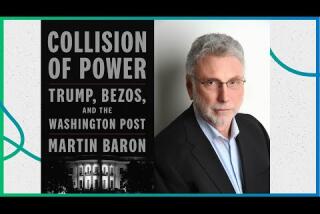TV REVIEWS : ‘Reston’: Slightly Out of Focus
- Share via
The hokily titled portrait “James Reston: The Man Millions Read” (at 10 tonight on KCET-TV Channel 28; 8 p.m., KVCR-TV Channel 24) might well have been retitled “James Reston: The Man Washington Feared.” Bursting onto the journalistic scene at the height of what Walter Lippmann dubbed “The American Century,” Reston became the New York Times’ man in Washington as global power shifted into U.S. hands with World War II victory and the Cold War.
This fact is perhaps too underplayed in this sometimes soft portrayal of a complex man. Whether the softness comes from the New York Times being a co-producer (along with PBS affiliate WVIA-TV) is something for the viewer to ponder. But producer-director Susan W. Dryfoos might have borrowed from Reston’s own practice as a cool, eloquent observer of his subjects. Instead of a removed, fair but critical overview of a powerful journalist, “Reston” always remains just slightly out of focus.
Reston’s impact is best conveyed here by his Times colleagues, such as the chummy Russell Baker, crusty Tom Wicker and observant David Halberstam, who notes how other writers even mimicked Reston’s casual patrician demeanor in the newsroom (there is almost no photo of Reston without his long pipe). They still marvel at how Reston secured exclusive interviews with world leaders, such as John F. Kennedy, even as a pack of press was waiting to pounce on the other side of the door.
Reston learned how to master the newswriting art by doing, not by school training, and the program portrays this very well. But while he credits his wife, Sally, with his intellectual development, author Nan Robertson notes how Reston ran his Washington bureau like “a men’s club.” Author Gay Talese has a very few choice cuts at Reston as well--his manipulative nature, his coziness to such figures as Henry Kissinger--but the negatives on this reporter are pared down, almost as if they would be unbecoming toward a fellow in his retirement years.
Like the politicians he examined with one of the most elegant prose scalpels ever set in newsprint, Reston bristles at criticism, especially his coziness to Kissinger. He’s justifiably proud of his getting the Times to print the scandalous “Pentagon Papers,” but dismisses his paper missing out on the Watergate story as merely “dropping the ball.” Why it did, Reston is never asked. Were Reston behind the camera instead of in front of it, you can be sure that he would have gotten an answer.
More to Read
The complete guide to home viewing
Get Screen Gab for everything about the TV shows and streaming movies everyone’s talking about.
You may occasionally receive promotional content from the Los Angeles Times.






